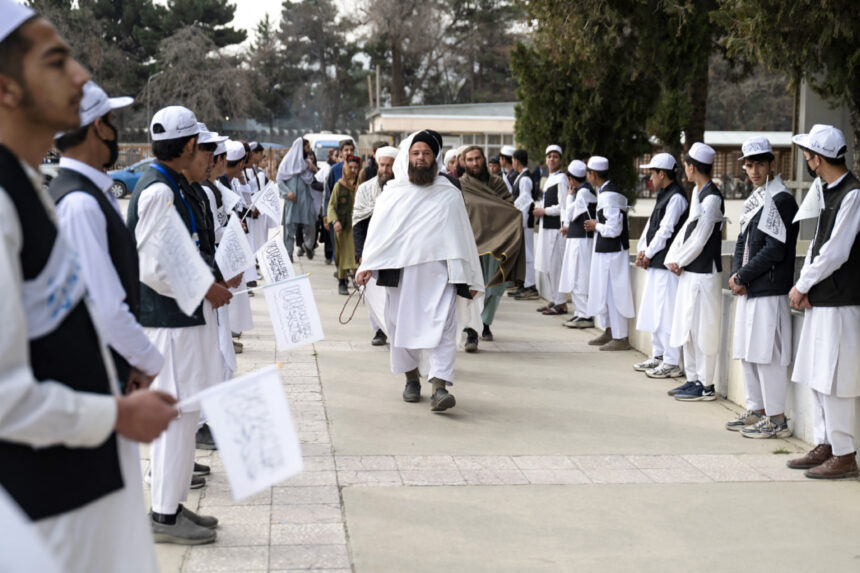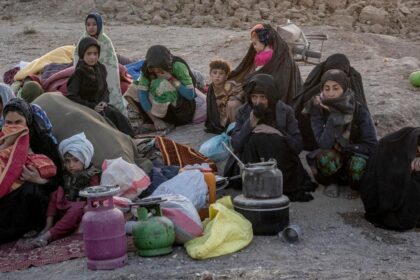RASC News Agency: The human rights organization Ravandari has issued a harrowing report detailing the profound transformation of Afghanistan’s education system under Taliban rule. The report reveals a systematic shift in the nation’s educational framework, now serving as a tool to propagate the Taliban’s extremist ideology, with religious indoctrination replacing what was once a diverse and inclusive curriculum.
The report underscores the pervasive chaos and disarray within Afghanistan’s educational institutions. Curricula across schools and universities have been stripped of academic rigor, reduced instead to instruments of ideological indoctrination. As a result, a significant number of male students have abandoned formal education in favor of Taliban-run Madrasas, compelled by the regime’s indifference toward secular studies. Families, subjected to relentless propaganda, are pressured to enroll their children in religious schools, further eroding the fabric of quality education in the country.
Alarming Exploitation and Suppression
The report sheds light on appalling allegations of widespread sexual harassment targeting female teachers and students in schools under Taliban control. These abuses often remain unreported due to the oppressive environment, fear of retaliation, and societal stigma. Victims and their families face insurmountable challenges in bringing these incidents to light, with only a fraction of such cases ever revealed.
The Plight of Women and Girls
A focal point of the Ravandari report is the dire plight of women and girls in Afghanistan’s educational system. The Taliban have systematically dismantled their right to education, enforcing draconian restrictions through decrees like the “Propagation of Virtue and Prevention of Vice” law. Severe limitations have been imposed on institutions, and comprehensive revisions to curricula have eliminated subjects such as civic education, social sciences, arts, and minority religious studies, deemed “unnecessary” by the regime.
The Ministry of Education has introduced clerics and Quran reciters to every school, prioritizing religious instruction over academic development. Subjects like human rights, peace studies, and democracy have been eradicated, while Persian Dari has been significantly reduced or removed, making way for an expanded emphasis on Pashto and Islamic studies.
Discrimination Against Minorities and Vulnerable Groups
The report highlights the Taliban’s discriminatory practices against ethnic and religious minorities. In provinces like Baghlan, experienced Tajik and Uzbek teachers have been dismissed and replaced with underqualified Taliban loyalists. The education of minority children in their native languages, along with lessons in their cultural and historical heritage, has been systematically undermined.
Girls with disabilities face additional barriers to accessing education, and older girls are increasingly restricted from attending private educational centers. In several provinces, new decrees mandate that girls under the sixth grade must wear burqas, gloves, and adhere to strict Taliban-imposed dress codes, further marginalizing them.
Militarization of Education
The Taliban have institutionalized their extremist ideology through the introduction of a new subject called “Emarat Studies.” Students and educators are compelled to participate in rigorous exams comprising up to 250 questions, reflecting the regime’s ideological orthodoxy. Meanwhile, Islamic Studies (Thaqafat Islami), previously capped at six credits in a four-year academic program, has been expanded to a mandatory 24 credits. In some faculties, this subject has been increased sixfold, crowding out critical academic and technical fields.
Far-Reaching Consequences
The Taliban’s policies have profound social, economic, and psychological implications for Afghanistan. By systematically denying women and minorities access to education, the regime is entrenching poverty, eroding social cohesion, and dismantling two decades of progress. The Ravandari report paints a grim picture of Afghanistan’s future, as generations are deprived of the skills and knowledge necessary to rebuild the nation.
In its comprehensive 40-page analysis, Ravandari calls for urgent international action to safeguard the right to education and mitigate the long-term consequences of these oppressive policies. Without intervention, Afghanistan risks spiraling further into an abyss of extremism, ignorance, and despair, leaving its most vulnerable populations to bear the brunt of this systemic collapse.






